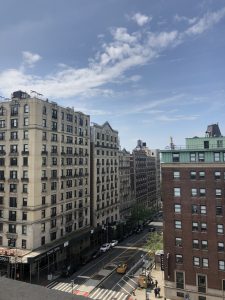
Photo credit: Sara Bell
The joke goes like this: by the time I graduate, I’ll have gone to all four undergraduate schools. Now that I’ve gone through the first three, having originally enrolled in the School of Engineering and Applied Science (SEAS), transferred to Columbia College (CC), and lived in Barnard housing, all that’s left to do is to wrap things up at the School of General Studies.
I mentioned this transfer on this blog back in October. That post concerned the idea of a strict divide between STEM fields and the humanities, and why rethinking that divide can help you reconsider and clarify your academic interests. I consider myself pretty invested in this question: I started college out, after all, as a mechanical engineering major, and now I’ll graduate with a major in English. (Before you ask: due to studying abroad, I do have to finish Literature Humanities this spring, in my final semester of college as an English major. The irony abounds.) But I didn’t really get into the nuts and bolts of the transfer, why I transferred at all, or how the choice to transfer has shaped my college career in unpredictable and rewarding ways.
I transferred partly because after a year in SEAS I knew more about what I needed and didn’t need from college, just as I learned more about what a university is, and what it is meant to do. People talk sometimes about learning how to quit, but it’s also worth thinking about how to self-evaluate even before the idea of quitting enters the conversation. College is fast-paced, but also precious time, both monetarily and intellectually. Are you getting out of it what you want to? How can you make changes to your plans to better align your time in college with your goals and wants? Use your friends, your advisor, the various undergraduate advising offices, and time to yourself to ask these questions. Any resulting changes aren’t always going to be so dramatic as an internal transfer or switching majors—they can be as simple as committing to always starting your reading on Friday rather than leaving it all until Sunday night, or eating breakfast—but sometimes they will be.
Sometimes experience will teach you exactly what you want to do, and sometimes it won’t teach you anything besides what you don’t want to do. But knowing what you don’t want to do is deeply helpful in its own right, and being honest with yourself about when you seriously feel that way will save you time and worries down the line. Having a serious think about whether to transfer from SEAS to CC cemented this lesson for me early on in college, and even if you’re just going to start eating breakfast, moments of self-evaluation can help you understand the value of this very act. I stopped thinking of school as four years of an obstacle course, and began to see it as a set of tools and experiences and ideas that would help me understand myself and my goals, and then help me achieve them. That initial step of understanding may seem obvious, but it’s easy to forget to do it, and sometimes scary to act on it.
This kind of thinking has carried out over all of my academic work: hence how all of this relates to research. In my senior thesis, in a term paper, and throughout my four years of college, I am brainstorming, evaluating, drafting and then executing a project. Being honest with myself about that drafting portion has made the execution all the more worth it.
